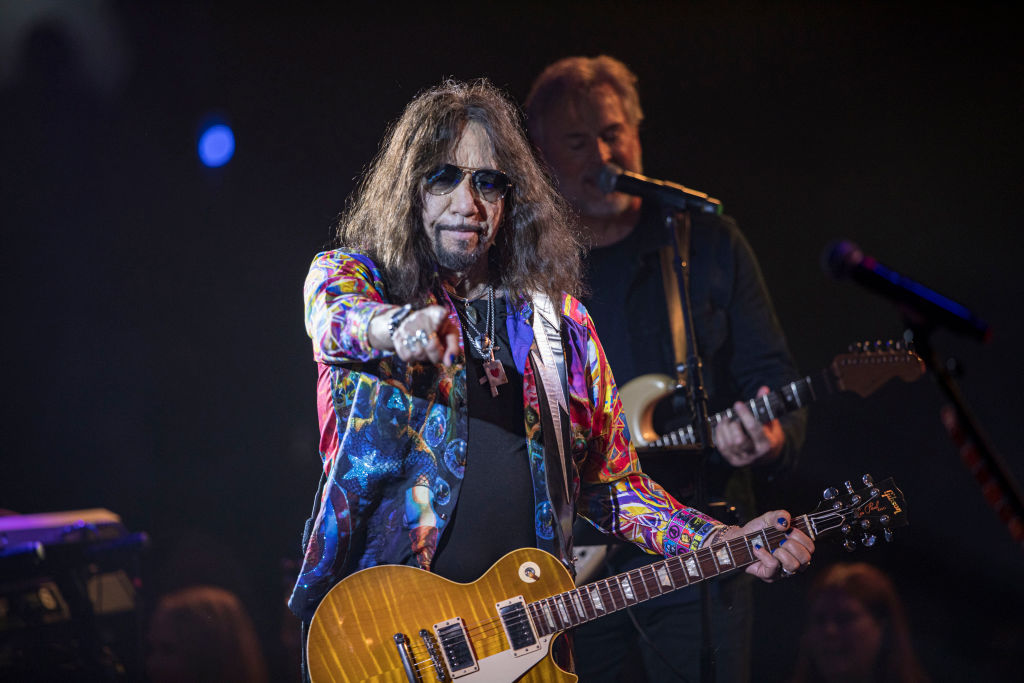
When Kiss was founded in 1973, the rock band’s four original members invented characters that reflected their obsessions. Bassist Gene Simmons—who had been raised on a steady diet of comic books and monster movies—became “the Demon,” a blood-spitting, fire-breathing creature from the land of nightmares. Frontman Paul Stanley became “the Starchild,” a flamboyant, lustful figure of rock and roll showmanship who sought to bury his insecurities beneath the adulation of fans. Drummer Peter Criss, meanwhile, became “the Catman”: After surviving numerous scrapes on the rough streets of post-war Brooklyn, he was convinced he had nine lives.
Then there was Ace Frehley, the lead guitarist. Inspired by his enthusiasm for technology and all things extraterrestrial, he became “the Spaceman,” an alien from the planet “Jendell,” who fired rockets from the neck of his guitar and struggled to walk in a straight line. Naturally, he blamed the Earth’s foreign gravity rather than his taste in recreational substances.
After departing Kiss in 2001, Frehley abandoned most of the old facade. For the last 17 years, he’s been sober, performing as a solo artist in street clothes with a band of greasy, denim-clad musicians behind him. But though his stage persona has been brought down to Earth, his mind seemingly remains somewhere in the cosmos.
Sitting in his home recording studio in rural New Jersey, the walls behind him decorated with murals of stars, galaxies, and Gibson Les Pauls, Frehley begins talking to me about his latest solo album, 10,000 Volts. It bears all of his usual hallmarks. There are silly, sex-crazed lyrics that often defy basic norms of language (“Your charming allure, you’re like the girl next door / Your magic ensues all the others”); powerful riffs that instantly lodge themselves in the mind; and sloppily melodic solos redolent of the 1970s. Frehley tells me he’s “pleasantly surprised and presently pleased” with the album’s success. “I can’t believe the first single got over a million views on YouTube and had so many streams on Spotify and what have you. It’s never happened to me before with a record.”
But when I ask him a few more prosaic questions about the songwriting process and where he finds inspiration, he answers with limited enthusiasm. His true passions, it turns out, are far more exotic. They only reveal themselves when we turn to the subject of alien conspiracies.
“The last UFO I saw was probably six or seven years ago,” Frehley cheerfully recalls. “I was on a plane in first class on the right side, sitting by a window. We were going from Vegas to LA … kind of crosses over the area of Area 51, maybe within 100 miles or so. I saw a UFO come out of the clouds and then go back down. The classic UFO that you’ve seen a lot of times, you know, in pictures and stuff. It was there.” He’s reminded of the anecdote when I ask about “Up in the Sky,” a song on the new album that playfully reminds listeners, “you can’t trust the news, you can’t trust the law.”
Frehley’s always been an outspoken UFOlogist. In addition to believing that he himself is “part alien,” he’s stated in the past that aliens have abducted him and landed outside his house. He also claims to have been punched in the face by a ghost. (He refuses to say anything decisive about the existence of Bigfoot.) It’s unsurprising, then, that he thinks the U.S. government has been covering up the presence of alien life on Earth since the Roswell incident in 1947.
Read more!



